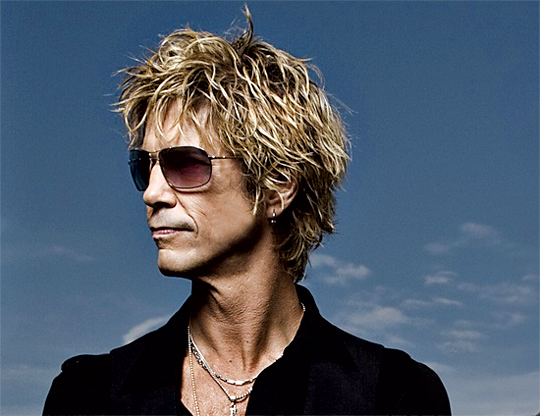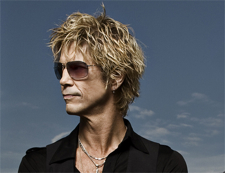Kurt Bloch, left, at Sub Pop’s 20th anniversary party at Hattie’s Hat on April 2.
Photo by Sarah Joann Murphy.
Duff McKagan’s column runs every Thursday on Reverb.I got an email the other day with a question from a friend who was basically trying to settle a bet. The argument was over what actually defines ‘Alternative’ music and also what makes up an ‘indie’ band. While on the one hand, I hoped my answer at least put some clarity to my friend’s argument, I also knew that my ‘answer’ would be un-provable. You see, I was around when the term ‘alternative’ was first used for radio and I was an early advocate, but much of this period in music is now all but forgotten. Rock history will more than likely remain silent as to the progression of radio’s role.
Kurt Bloch should have a star. That is, of course, if modern rock music had a street on which stars were placed for its pioneers. If any of you indie rockers are scratching your head now and saying “Who?” well, shame on you. Back before there was Sub Pop here in Seattle, and back before there was any attention at all being paid to the Northwest as far as music goes, there was a scene and it was truly ‘alternative’ and ‘indie’.
In 1978, Kurt had a radio program at Nathan Hale High School and he simply played and did what he wanted to do. Kurt had started a band with his brother, Al, named the Cheaters. The Cheaters started to write songs and play gigs, mostly at parties and mostly for fun, but they were playing their own UNIQUE music. There were no record labels back then other than the Majors, but Kurt wanted to put a single out. He did what, unbeknown to him, other independent bands then were doing in other parts of America; he started his own label.Understand that if your music is not ‘commercial’ enough for a larger record company to see a profit in, you are left to your own devices. These ‘devices’ became THE spearhead for burgeoning individualistic punk rock scenes throughout North America. Rock radio wouldn’t touch it because advertisers didn’t see the value in catering to a small smattering of punk rock and other ‘alternative’ styles. These other alternatives were bands like Motorhead, Iggy, Grandmaster Flash, and even AC/DC for their first record at least (the first American press for AC/DC came thanks to ‘PUNK’ magazine, in fact).
On the far left of your FM dial, you will find the stations that havebeen given space according to some FCC rule that provides fornon-profit organizations with radio broadcast capabilities. In Seattle,KCMU started to play national and international bands like U2,Psycadelic Furs, the Ramones, Iggy, and Souxie and the Banshees whilealso propping up local acts such as the Fastbacks (w/Mr. Bloch),Solger, X-15, the Accident, and DOA. You weren’t gonna like all of it,but KCMU became a radio station that started to expand the local musicscenes’ horizons. Punk Rock and New Wave gigs began to attract such alarge crowd, in fact, that an AM music station (KJET!!) sprang up.Commercial alternative radio had arrived in Seattle. Indie music comesfrom a term first used in the early 80’s by smaller stand-alone recordstores. One could search through records using the alphabetical tagsthat popped above the 12″ height of the rows of records. Moreadventuresome listeners could seek the harder-to-find bands in the’indie’ bin. Simply put, these were smaller acts on tiny independentlabels. Of course, as the popularity of these bands grew, major labelsoffered up a more lucrative deals to these acts. The ‘indie’ binhowever, remained the place to find cutting edge music, and eventuallybecame a marketing tool for major record companies later in the 80suntil this very day. A band would garner much more ‘street cred’ ifthey were deemed to be an indie band. Larger labels soon began to formsmaller imprint labels to cater to this record-buying street ethic.Alternative and Indie music became very, very popular. Like all thingsthat become popular, there are those that exploit them for the cashvalue. This commercialism, in turn, causes a rush to thebandwagon…and this is what we witnessed sometime around 1998. Whereonce had been originality with the likes of Pearl Jam and the BeastieBoys, now stood watered-down copycats such as Creed and Limp Bizkit.Alternative radio had once been a place to find new music and re-visitkiller songs by the Stooges and Joy Division. The term ‘alternative’was fast becoming the magnet by which audience-seeking advertiserswould be drawn to.Of course with alternative radio becoming so commercial, programmerswill eventually do what their advertisers ask…PLAY IT SAFE and don’talienate any part of our audience. Radio has become so damn vanillathat it’s a wonder ANYONE listens anymore. I know that I don’t. “Indierock” on the other hand, has become a catchall phrase for music thatmust seemingly remain lo-fi. I get it, and I really like a lot of indiemusic (are Shiny Toy Guns indie?), but when a band like the Yeah YeahYeahs claim that they are ‘indie’ while being signed to the biggestmajor corporate conglomerate record label (Interscope/Universal), Ijust have a hard time swallowing indie cred. It just seems like anotherselling tool and a good one at that. Hey, there is nothing wrong withmaking money whilst doing your art. The ‘indie’ moniker alas, justseems to be another contrived piece of misleading word-smithery andlow-resolution imagery. Hey, Urban Outfitter’s has got the one-stopindie lifestyle thing down to a T! So, let’s get back to Kurt Bloch.In my opinion, the way this guy leads his life and plays his musicshould be a touchstone for all of us who get too caught up in trying tolabel art. This dude has never changed his tune. The Fastbacks will godown as a band that kept its integrity, if nothing else. Kurt is stilla guy who gets real, real excited about new music (or any music forthat matter, he’s a walking encyclopedia!). He works at Gibson guitarsbecause, well, he loves guitars! His new band, Thee Sgt. Major III arekiller because they are oh so obviously ‘in it’ for the pure love ofplaying live and writing songs. Kurt never took much stock in labelinganything, that’s for sure. He is a one-of-a-kind, the kind of talentthat makes you forget all about what should or shouldn’t be ‘correct’in the music industry today. That’s my two-cents, anyway.






